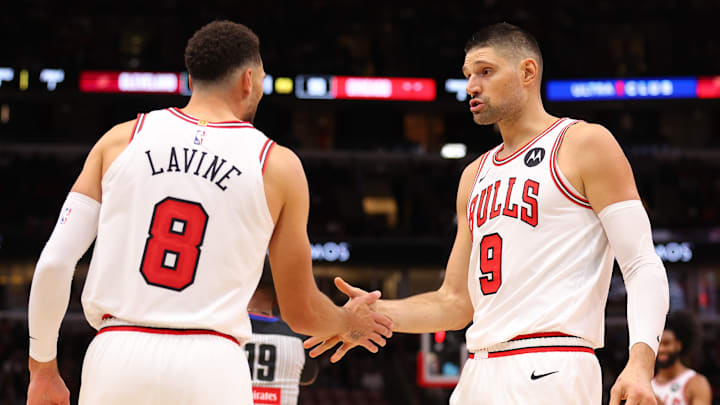The Chicago Bulls have been in limbo for quite some time. Chicago has failed to advance past the first round of the playoffs since 2015. More recently, the Bulls have failed to reach the postseason since 2022. To make matters worse, dating back to 2021, the Bulls' shift to competitive basketball was egregiously apparent following the midseason trade for Nikola Vucevic.
Not soon thereafter, Chicago acquired Lonzo Ball in an offseason trade to stabilize the backcourt. Early results were extremely promising as Chicago fielded the Eastern Conference's best record by the season's halfway mark. Morale was high until a meniscus injury shelved Chicago's floor general for six to eight weeks.
While optimism remained intact, the Bulls' stellar record began to collapse. Chicago battled the Miami Heat for first place for over a month before sliding down the conference hierarchy in March. With hopes of Ball's postseason return, securing a top-five seed wasn't out of the question to preserve a deep playoff run.
It all came crashing down on April 6, when Ball was ruled out for the season. The Bulls went on to face the Milwaukee Bucks in the first round and only managed to win a single game. Despite possessing a relatively similar group of players, Chicago hasn't been back to the playoffs since.
The Bulls are gearing up for an important trade deadline
Sans DeMar DeRozan, who departed this offseason, Chicago still rosters Vucevic, Zach LaVine, Coby White, Patrick Williams, and Ayo Dosunmu from its most recent playoff squad. Of the aforementioned players, LaVine and Vucevic will turn 30 before the end of the season. Currently sitting at 3-5 following multiple seasons of mediocracy, it certainly appears Chicago will be active during this season's trade deadline and beyond.
Shipping out LaVine and Vucevic might've even occurred last season if not for LaVine's injury and Vucevic's disappointing campaign. The Bulls were right to cut ties with DeRozan, although the return wasn't exactly a world-beater, re-signing a 35-year-old swingman provided no value to a team that hadn't reached the postseason in years.
Cutting ties with DeRozan and acquiring 22-year-old Josh Giddey suggested a rebuild. Nevertheless, LaVine and Vucevic remained Bulls. As previously mentioned, both players' circumstances played a role in Chicago's reluctance to part ways. Zach appeared in just 25 games, while Nikola struggled mightily with his shooting a season ago.
LaVine and Vucevic's values are on the rise following disastrous seasons
Now, eight games into the 2024-25 season, LaVine has appeared in six games thus far, leading Chicago in points, three-pointers made, three-point percentage, and free throw attempts per game. Vucevic has appeared in all eight games while recording the most efficient shooting season of his career, albeit on a small sample size.
According to ESPN, this is all a part of the long-term plan. In an article depicting Giddey's value in Chicago, ESPN's Jamal Collier mentioned the Bulls are, "still expected to explore trade options for both LaVine and Vucevic later in the season…but the focus now is for both players to rebound after disappointing 2023-2024 seasons."
Unlike most franchises, it's taken what feels like an eternity for Chicago to accept a rebuild, but recent signs have finally pointed to Alturas Karnisovas and Company ushering in a new era of youth. Coincidentally, the Bulls' most recent draft picks, Dalen Terry and Matas Buzelis, combined for 23 points in 47 minutes of action against the Dallas Mavericks on November 6.
Perhaps retaining LaVine and Vucevic for half this season isn't the worst outcome. The Bulls will likely continue to lose games while both players produce at high levels. Chicago will, in turn, be able to trade its former cornerstones for draft assets and additional youth by the trade deadline.
Acquiring draft capital is of grave importance, especially because the Bulls will likely be without a first-round pick in 2025. If one of LaVine or Vucevic is moved for a first-rounder in this year's draft, consider it a success following years of unwillingness to accept a rebuild.
